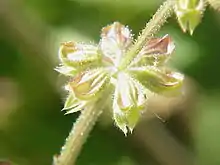| Salvia bulleyana | |
|---|---|
 | |
| Scientific classification | |
| Kingdom: | Plantae |
| Clade: | Tracheophytes |
| Clade: | Angiosperms |
| Clade: | Eudicots |
| Clade: | Asterids |
| Order: | Lamiales |
| Family: | Lamiaceae |
| Genus: | Salvia |
| Species: | S. bulleyana |
| Binomial name | |
| Salvia bulleyana | |
Salvia bulleyana is a perennial plant that is native to Yunnan province in China, growing on hillsides at 2,100 to 3,400 m (6,900 to 11,200 ft) elevation. S. bulleyana grows on a few branched stems with ovate to ovate-triangular leaves.
Inflorescences are 4 flowered verticillasters in loose racemes or panicles that are 15 to 30 cm (5.9 to 11.8 in), with a purple-blue corolla that is 2 cm (0.79 in).[1]
S. bulleyana is closely related to and commonly mistaken for another Yunnan Salvia, Salvia flava. In Great Britain and the U.S. nursery trade, S. flava is often sold as S. bulleyana. The flowers of S. bulleyana are purple-blue with no spotting, while S. flava has yellow to yellow-brown flowers with a purple spot on the lower lip.[2]
Notes
- ↑ "Lamiaceae" (PDF). Flora of China. Harvard University. 17: 160. 1994. Archived from the original (PDF) on 2010-07-14.
- ↑ Clebsch, Betsy; Barner, Carol D. (2003). The New Book of Salvias. Timber Press. p. 118. ISBN 978-0-88192-560-9.
This article is issued from Wikipedia. The text is licensed under Creative Commons - Attribution - Sharealike. Additional terms may apply for the media files.